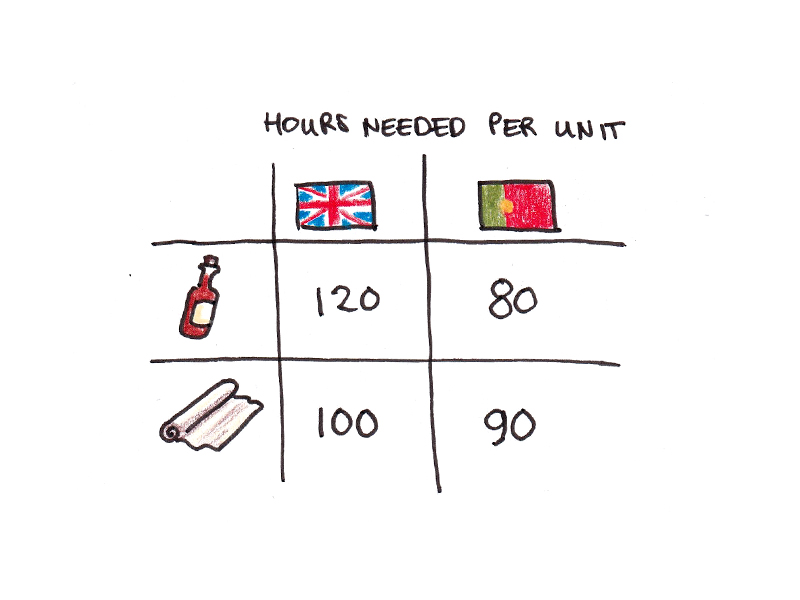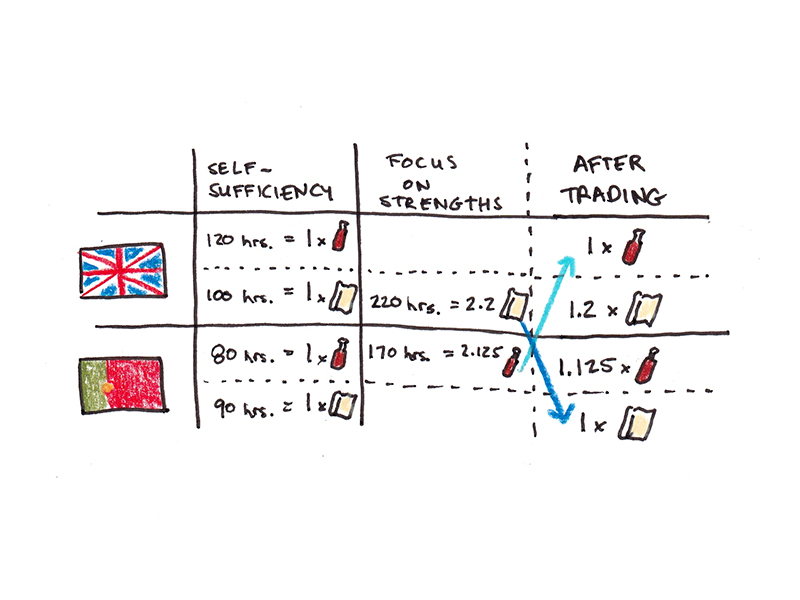Few pieces of self-help lore are as misunderstood as the advice to “focus on your strengths.” Like most popular ideas, it has a kernel of truth, but there are also many situations where it simply doesn’t apply.
In fact, the opposite—focusing on your greatest weakness—is often more productive. There is a simple mental model for understanding the distinction.
When Focusing on Your Strengths is Helpful
The basic argument for focusing on your strengths is the economic principle of comparative advantage, first articulated in 1817 by British economist David Ricardo.
Ricardo considered two different countries, Portugal and England, who produced two different goods: cloth and wine. Suppose, Ricardo argued, that Portugal was a generally more efficient country than England, so that the hours needed to produce one unit of each looked like so:

If the two countries cannot trade, it takes 220 hours for England to make one unit of both wine and cloth, while it takes Portugal 170 hours to do the same. In contrast, if trading is allowed, both will be better off if they specialize. In the same amount of time it takes to make one unit of each cloth and wine, England could make 2.2 units of cloth and Portugal could make 2.125 units of wine. If both trade one-for-one, that gives England an extra 0.2 units of cloth and Portugal an extra 0.125 units of wine for the exact same amount of work.

In your own life, there are plenty of places where the theory of comparative advantage makes sense. Most people only perform a few different kinds of work, even though our standard of living relies on tens of thousands of distinct professionals. Within a family or a corporation, each individual adopts a specific role. Each person specializing in a niche of their strengths, rather than being a generalist, makes us all better off.
However, note a key assumption: you need to be able to trade in order to ignore your weaknesses!
When Focusing on Your Weaknesses is Helpful
Weaknesses deserve our focus when they cannot be delegated, outsourced or ignored. There are plenty of situations when a skill cannot be delegated to someone else:
- When one component of a skill is necessary for another. A lawyer who isn’t a good reader can’t be a good lawyer—there’s too much reading in the job to avoid it. Similarly, a programmer can’t easily avoid knowing about systems that interact with her work.
- When there are rules forbidding it. A golfer can’t hire a replacement to putt for him, even if he’s lousy on the green.
- When transaction costs make outsourcing prohibitive. I’m not a great handyman. I wouldn’t attempt a bathroom or kitchen renovation by myself. But fixing a squeaky hinge or hanging a picture frame isn’t going to be worth the cost of hiring someone, so it helps to learn to do it yourself.
In short, when a component of a skill is unavoidable, focusing on your weaknesses, not your strengths, becomes the more useful advice. When you can delegate, outsource or choose a niche that doesn’t require a particular ability, focusing on your strengths usually pays off.


 I'm a Wall Street Journal bestselling author, podcast host, computer programmer and an avid reader. Since 2006, I've published weekly essays on this website to help people like you learn and think better. My work has been featured in The New York Times, BBC, TEDx, Pocket, Business Insider and more. I don't promise I have all the answers, just a place to start.
I'm a Wall Street Journal bestselling author, podcast host, computer programmer and an avid reader. Since 2006, I've published weekly essays on this website to help people like you learn and think better. My work has been featured in The New York Times, BBC, TEDx, Pocket, Business Insider and more. I don't promise I have all the answers, just a place to start.